With just a few days until Iowa, the concentration is naturally on the delegate races, but general election polling continues as well. Until we have actual delegate counts, we’re still following changes for the five best polled candidate combination. With the newest batch of polls, we have two of the Republicans strengthening their position against Clinton in Minnesota.
Clinton vs Rubio
There hasn’t been a lot of polling in Minnesota, but what there is has been tilted further toward the Republicans than the five election average I use as a starting point for my poll averages. With the latest poll, the average moves to a Clinton lead of only 1.5%. This makes Minnesota start looking like a pretty close state. It makes Minnesota a possible pick up for Rubio, and therefore improves his “best case” against Clinton:
What’s remarkable looking at Clinton vs Rubio at this point is the huge number of close states. There are 146 electoral votes in the “up for grabs” category, where the polling margin is under 5% and it would be very easy to imagine the state going either way. Add to that that the tipping point is only a 0.2% Clinton lead, and Clinton vs Rubio is the most evenly matched of the five best polled candidate combinations by a decent margin. The race is very close, and the “best cases” for the two candidates are relatively close to being symmetric.
If the Republican race was about picking the candidate most likely to beat Clinton, Rubio would be way ahead. But it isn’t, and he isn’t.
Clinton vs Cruz
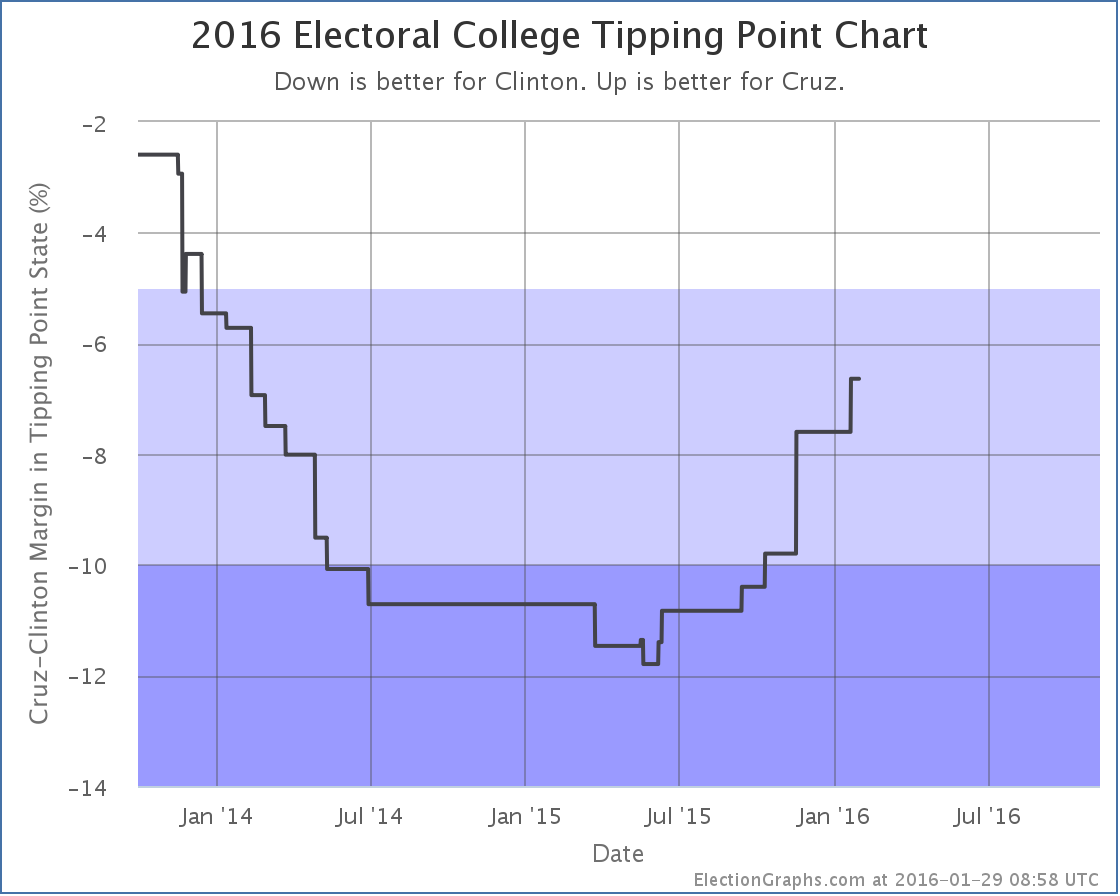
Cruz improved in Minnesota from being behind Clinton by 8.8%, to only being behind by 6.3%. This did not result in a category change, but it did move the tipping point… the state that puts the winning candidate over the edge if you put the states in order. We go from the tipping point being Virginia with a 7.6% Clinton lead, to being Florida with a 6.6% Clinton lead. This still means Cruz is very far behind. He is clearly losing to Clinton. It isn’t particularly close. But it is closer than it was. Cruz has been consistently improving on this metric since June. If Cruz stays in contention in the primaries, watch this number to see if this trend continues and Cruz starts making it an actually competitive race, or if Clinton vs Cruz continues to look like an easy Clinton win.
Clinton vs Trump
OK, technically Clinton vs Trump is #6 in terms of how well polled the candidate combination is, which means by my rules I wouldn’t be talking about it right now. But given Trump’s position in the polls, I’ll mention it anyway. New Clinton vs Trump polling in Michigan (not in Minnesota like the other two) increases Clinton’s lead from 2.4% to 3.0%. This does not move Michigan to a new category, but it does move the tipping point. In this case the tipping state was and still is Michigan, so the tipping margin just moves from 2.4% to 3.0%. There isn’t enough here to declare a real trend. And both 2.4% and 3.0% are “close”. So either way, a Clinton vs Trump race is one with a small Clinton advantage, but still a race that could go either way.
In just a few more days, we’ll have actual delegate leaders in both parties. Things are moving fast.
284.6 days until polls start to close on Election Day 2016.
Note: This post is an update based on the data on ElectionGraphs.com. Election Graphs tracks both a poll based estimate of the Electoral College and a numbers based look at the Delegate Races. All of the charts and graphs seen in this post are from that site. Additional graphs, charts and raw data can be found there. All charts above are clickable to go to the current version of the detail page the chart is from, which may contain more up to date information than the snapshots on this page, which were current as of the time of this post. Follow @ElectionGraphs on Twitter or like Election Graphs on Facebook to see announcements of updates or to join the conversation. For those interested in individual general election poll updates, follow @ElecCollPolls on Twitter for all the polls as they are added.
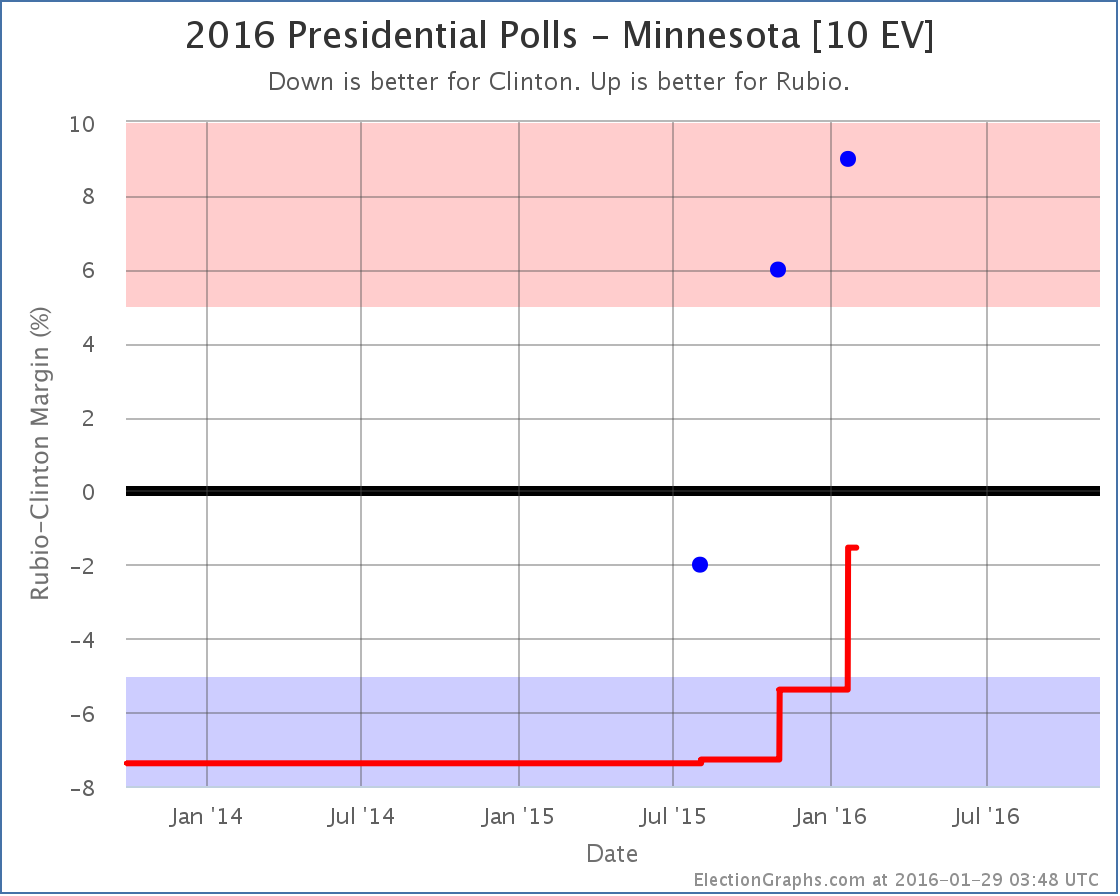
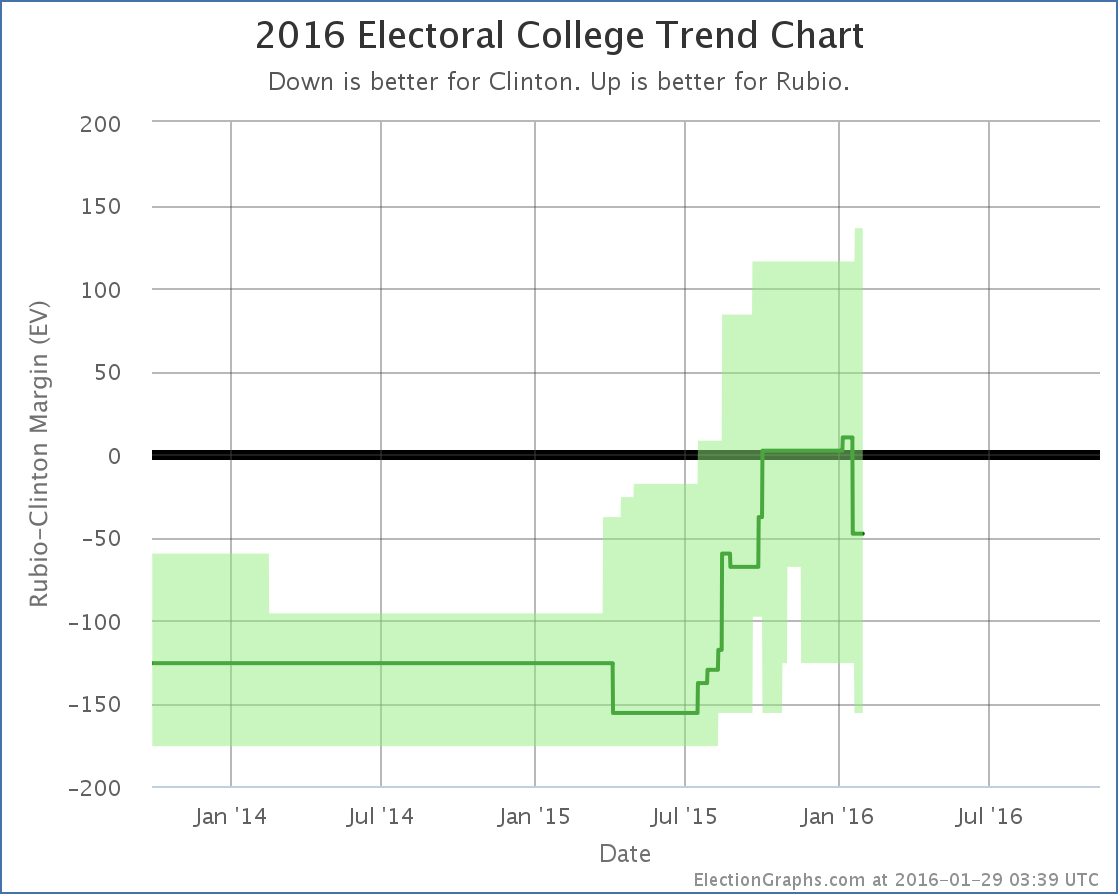
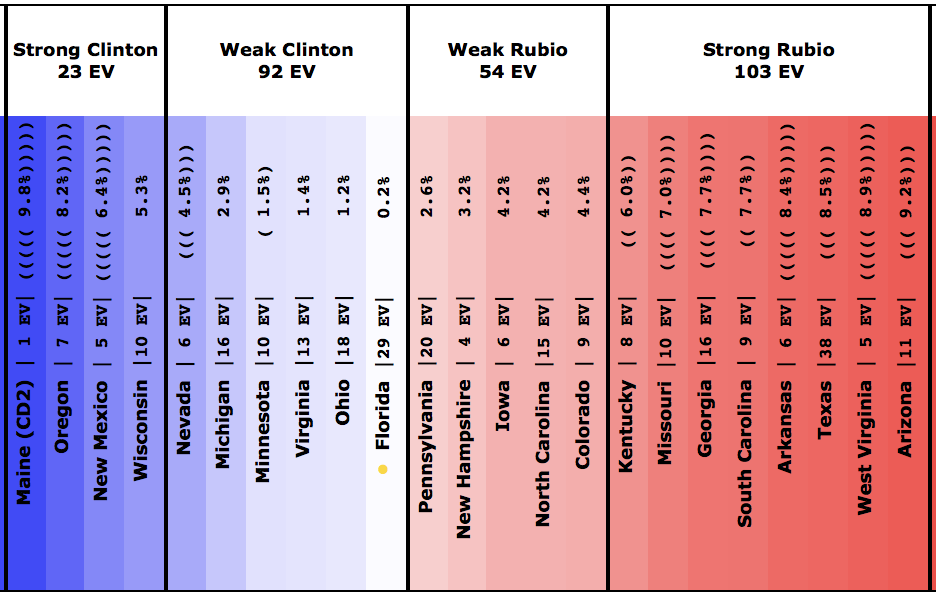
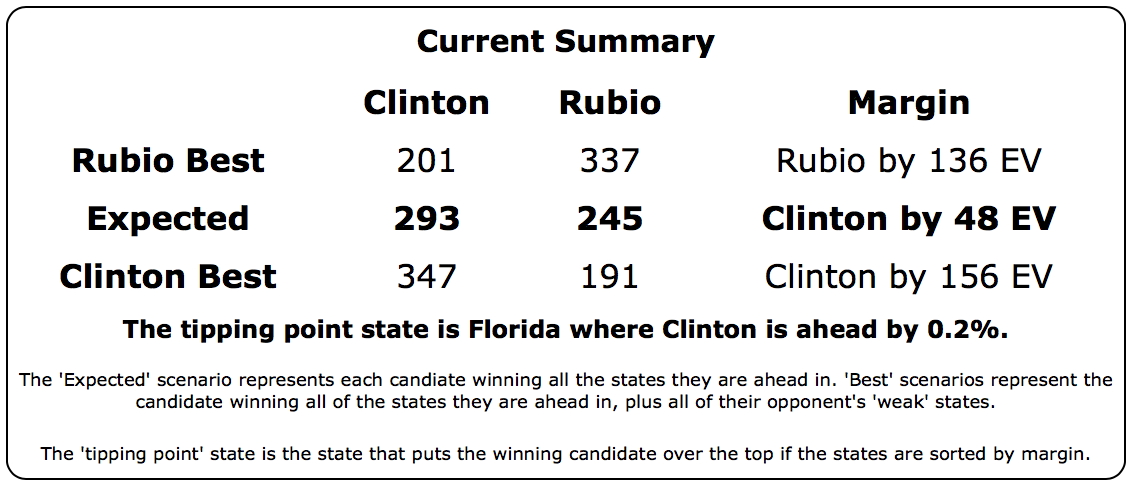
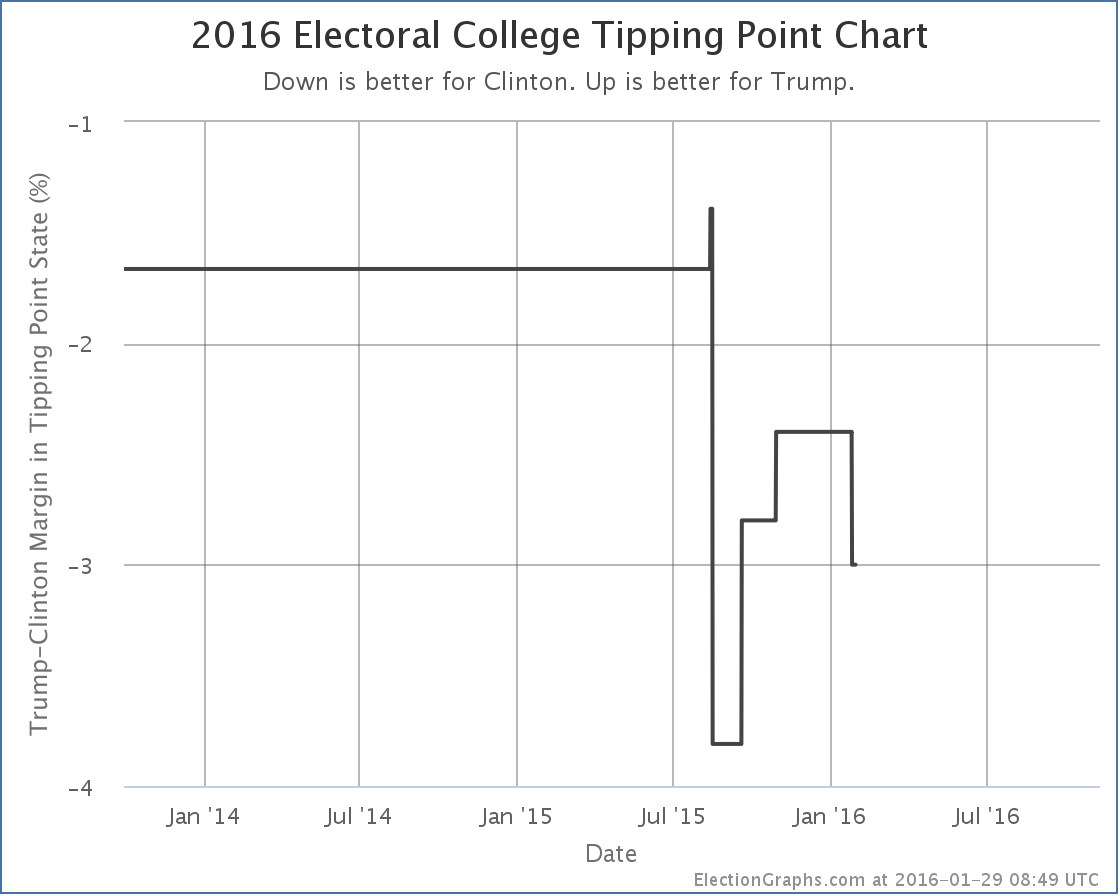
[Blog post] Electoral College: Cruz and Rubio strengthening in Minnesota https://t.co/42XodWSaoL
I think Bernie is going to surprise you.
The post you replied to didn’t even mention Sanders. :-). Let’s see. Sanders winning Iowa would be a come from behind, but not surprising, it is close. Sanders winning New Hampshire, also not a surprise, actually completely expected. Now, Sanders winning South Carolina, that would be a surprise. Is that what you are predicting?
The fact that he wasn’t mentioned is exactly why I posted it.
SC will be a lot closer than Iowa and NH. Not sure which way they will go. If it were Arkansas good ol boy Bill, it’d be a lock. But Hillary is a Yankee, same as Bernie.
As I have explained in a bunch of my posts, I talk about the best polled candidate combinations. The best polled combination with Sanders is Sanders vs Rubio, but it is 9th best polled, so not really good data quality yet. I mentioned Clinton vs Trump even though that is #6 at the moment because of the polling leads on both sides. For an extensive discussion of Sanders, see the kickoff post I did analyzing the Democratic delegate race as it stands going into Iowa. Sanders has a significant uphill fight. http://www.abulsme.com/2016/01/27/delegate-race-clintons-big-head-start/
Note Sanders did get one more superdelegate since I made that post. Percentage he needs therefore dropped from 54.22% to 54.21%. :-)
As I said: surprise.
I was at the campaign kickoff of a former Congressman, who is running to get his seat back. He declared support for Hillary in early December. He asked me who I wanted to be President, and I told him I support Bernie.
He nodded and said something to the effect that, in December, no one expected Bernie to be as popular as he is, and – well – no one wants to piss off Hillary.
So I think a lot of politicians have been vocally backing Hillary out of fear. Once the actual numbers start coming in though, I think (hope) you’re going to see the supers fall behind Bernie in droves.
Your numbers are certainly legitimate, but they reflect the feelings of the oligarchy. The populace still picks the leaders, however.
Also, SC being closer than IA and NH would be a tall order. Right now RCP averages, IA has Clinton lead of 2.5% (very close, could easily go either way), NH has sanders lead of 14.3% (not particularly close at all, Clinton win would be surprise), but SC is a 29.5% Clinton lead at the moment… not close at all. Even if Sanders got a huge boost following a double win in IA and NH, it would be a shocker if SC was close. (I’ll define close as less than a 5% margin in either direction.) Now, having said all that, I’m not sure even a double Sanders win would be enough to get to that close result in SC, but there are many things Clinton herself could do to case that. She has shown herself very capable of shooting herself in the foot.
Jay Duff 54% is not undoable. It is certainly quite mathematically possible for Sanders to get on a pace and stay on a pace to catch up. But Clinton is further ahead than she was at this stage in 2008 by a significant margin, so it is a significantly larger task than Obama had in 2008, not a comparable one. Having said that, if indeed Sanders was surging and looking like he was on pace to catch up and win, you certainly would see supers that already came out for Clinton start to defect. But I don’t think you’d see that in LARGE numbers unless Sanders was already on pace to catch up and win WITHOUT their support and it was clear Clinton was going to lose. Having said that, my prediction at this point is that Sanders does strongly enough in Iowa and New Hampshire that we hear a media firestorm about Clinton’s weakness and the Sanders surge for a little while… until South Carolina, when Clinton will not do as well as her poll numbers as of today because of a bit of Sandersmentum, but she still wins handily there. Then she cleans up on super Tuesday and it becomes clear to all but the Sanders die hards that the Clinton win is going to happen. Again, unless she herself does something to screw it up. Which she is very capable of doing.
So, to be clear, the surprise you are predicting is that South Carolina ends up close? Under 5% margin? I’ll check back in with you on that after South Carolina. :-)
I will say, from a boots-on-the-ground perspective- Sanders’ campaign, in Illinois, is not nearly as well organized nor as large as Obama’s was. BUT I haven’t even SEEN Hillary campaigners around here. So, either she figures her Chicago connection is all she needs, or she just isn’t thinking about Illinois yet.
I think the surprise will be the nomination as a whole, will be close, not one particular state or another.
Probably the latter. The Illinois primary isn’t until March 15th. Before that we have Iowa (Feb 1), New Hampshire (Feb 9), Nevada (Feb 20), South Carolina (Feb 27), Alabama (Mar 1), Arkansas (Mar 1), Colorado (Mar 1), Georgia (Mar 1), Massachusetts (Mar 1), Minnesota (Mar 1), Oklahoma (Mar 1), Tennessee (Mar 1), Texas (Mar 1), Vermont (Mar 1), Virginia (Mar 1), Kansas (Mar 5), Louisiana (Mar 5), Nebraska (Mar 5), Michigan (Mar 8), Mississippi (Mar 8). Then Florida, Missouri, North Carolina, and Ohio are also on March 15 at the same time as Illinois. Frankly, I expect she expects to have things all but wrapped up with a commanding and almost impossible to catch up lead after March 1st. Now, she may be wrong, but given that calendar, she won’t be putting much efforts into states after March 1st unless it looks like she is going to not be completely dominant after March 1st, which she won’t really have a decent read on until late February when you start seeing significant polling for the March 1st states.
Obama set up shop, and ran his Iowa campaign from here. Bernie is doing the same.
Ah, nomination as a whole. Care to define numbers? How close does Sanders have to come to call it close? My own guess is that even if Sanders continues to fight it to the end like Clinton did in 2008 long after it was clear she was losing, it will indeed be clear that Sanders is not on a pace to catch up and win by mid-March at the latest. I’d have to do some delegate counting to see exactly when I’d want to predict hits marks like “55% of remaining delegates needed to win”, “60% of remaining delegates needed to win”, etc. I haven’t done that math yet. I’m guessing he will hit 60% in mid March, but again, I haven’t done the math to back that up yet. But it will be clear looking at the math and the trends. After New Hampshire, Sander’s “% of remaining needed to win” will go up after most contests, not down. That would be the indication that he was not getting the results he needed to be catching up. Note that that does not mean the media would be done making a race out of it. The media loves a race. Clinton vs Obama dragged out for MONTHS after it was clear Obama had an insurmountable lead. :-)
Is it that they love a race, or is it that they are paid for by Hillary?
Honestly, if Bernie loses Iowa, I think the media might be right, and he’s too left. If he wins, then I think his campaign is right, and the media is being manipulated by Hillary Гјber rich supporters, and he will fall within your definition of close – or better – in SC as well as the national primaries.
It’s not that I think your (or Nate Silver’s) math is wrong. It’s that Bernie’s campaign says that the media has been biased in coverage, and doesn’t reflect what people on the ground are saying or thinking. Indeed, they do not reflect what I think or say.
One thing I agree 100% with Nate Silver on is that, if Bernie loses Iowa, it’s over. If he can’t win a state that so reflects his own demographic sweet spot, he can’t win the race for President, and won’t get the nomination.
It is that they love a race. You see the same pattern time and time again in elections, both primary and general, no matter at what level. The media will latch onto any possible sliver of indication that whoever is in second place might be catching up, and will talk that up as much as they can. Similarly for stories that the frontrunner might be vulnerable. And if those types of stories don’t exist in plain sight, they go looking for them. An election where it is absolutely clear who is going to win is not interesting, and doesn’t bring viewers, listeners, or readers. A race that is close and could go either way gets people excited and interested and coming to find all the new juicy tidbits of the day.
Iowa will be close one way or the other. Getting 49% of the vote is not significantly different than getting 51% of the vote. At least nominally. Of course, press wise there will be a huge difference, so it does matter quite a bit anyway. If Bernie gets the majority of the popular vote, he gets the press benefit for the next few weeks, regardless of the delegate counts. In the end of course, it is the delegate count that matters. As I mentioned in my post, Sanders needs 24 of the 44 Iowa delegates who aren’t superdelegates to be on a pace to catch up and win. (And as I also mentioned, we’ll only have estimates this week, Democratic Iowa delegates don’t get chosen “for real” until April and June.) And while I think the only hope for Sanders is a Clinton implosion, not anything Sanders himself can do, losing Iowa would make even that hope much slimmer. (Not because the chances of Clinton imploding would be less, but because the chances of Dems looking to recruit someone else would increase if Clinton did indeed implode later in the process after she was clearly crushing Sanders. Second look at O’Malley maybe? Or some sort of Biden convention strategy?)